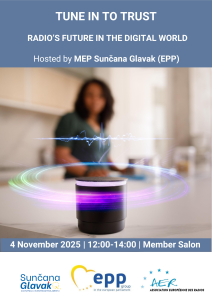EU policymakers and commercial radio leaders gather at the European Parliament to discuss radio’s future in the digital age.
On 4 November 2025, the Association of European Radios (AER) hosted a high-level roundtable at the European Parliament titled “Tune in to Trust: Radio’s Future in the Digital World.”
The event convened Members of the European Parliament, representatives from the European Commission and commercial radio leaders to explore how to safeguard radio’s accessibility, findability, and sustainability in an increasingly digital media landscape.
Radio remains Europe’s most trusted medium – delivering verified information, fostering local engagement, and providing critical updates during emergencies. Yet the sector faces mounting challenges: declining advertising revenues, the dominance of global digital platforms, and increasing regulatory burdens.
Key voices from the roundtable:
Hosting MEP Sunčana Glavak (EPP, HR) framed the opening remarks with a strong statement on radio’s role:
“Radio is not nostalgia -it’s civic infrastructure. In times of crisis, it remains the last reliable link between institutions and citizens. As technology evolves, we must protect trusted media -by keeping radio in the car, funding local journalism, and ensuring fair platform rules – so future generations grow up with trusted voices, not just louder ones”.
Stefan Möller (RadioMedia, Finland) President of AER, opened the discussion with AER’s vision for resilient radio: “To safeguard the future of radio, Europe must establish a forward-looking regulatory framework—one that guarantees radio remains accessible, discoverable, and free across all platforms, devices, and technologies.”
Anna Herold, Head of Unit, Audiovisual and Media Policy at the European Commission, outlined the EU’s legislative outlook, noting that while radio is among the media most affected by digital transformation, its role in crisis communication and democratic resilience remains irreplaceable. Safeguarding radio’s accessibility, sustainability, and public value requires robust media laws – such as the European Media Freedom Act – and policy initiatives like the Media Resilience Programme, including the European Democracy Shield and future funding mechanisms.
Daniela Beaujean (VAUNET, Germany), AER Vice-President added: “We need ‘one-click-to-radio’ access on every digital surface. The EMFA is a step forward to protect radio from digital exclusion by dominant gatekeeper platforms – but without other clear rules and strong enforcement, radio risks being sidelined.”
Corinna Drumm (VOEP, Austria) AER Vice-President focused on radio on the move, highlighting the role of the European Electronic Communications Code and the upcoming Digital Networks Act in ensuring fair access to in-car listening environments: “Radio must remain free to air, easy to access, and simple to use in cars – not just for convenience, but for safety. Drivers should be able to tune in without distraction. And when other networks fail during crises or blackouts, broadcast radio remains a lifeline – keeping people informed and connected.”
MEP Adina Vălean (EPP, RO) emphasised the importance of balance in digital policymaking:
“Radio is not a relic-it’s a lifeline. It remains one of the most trusted and resilient forms of communication, delivering public value across analogue and digital platforms. Technological neutrality must be at the heart of our policymaking, ensuring all broadcasters – large and small -can thrive in connected environments. The goal is clear: protect media plurality, support local content, and apply existing legislation effectively to safeguard Europe’s diverse media landscape.”
MEP Marcos Ros Sempere (S&D, SP), referencing recent blackouts in Spain and Portugal, reinforced radio’s role in emergency preparedness: “In a media environment more and more shaped by algorithms that fuel polarisation, disinformation, and fake news, radio has stood as the most trusted medium among people. That’s why radio must remain the place that people turn to when they need reliable, immediate information.”
Luka Duric (HRF, Croatia), AER Vice-President, warned of virtual assistants having become powerful gatekeepers to the digital audio world. He stressed that their designation under the Digital Markets Act is essential to ensure fair access, media diversity, and a trusted digital space where both technology and media can thrive. “When citizens say ‘Play the news’, they should hear Europe’s voice and not a global algorithm’s choice”, he concluded.
MEP Cynthia Ní Mhurchú (Renew, IE) stressed the need for effective enforcement and sustained investment: “Local radio is the heartbeat of our communities – a trusted voice that informs, connects, and defends against disinformation. To protect this cornerstone of public trust, we must invest in its future and ensure it remains accessible, inclusive, and resilient.”
Notable participants and key contributors to the roundtable included MEP Helder Sousa Silva, MEP Manuela Ripa, MEP Barry Cowen, MEP Michael McNamara, as well as Boriša Falatar, Cabinet member of European Commissioner for Equality, Preparedness and Crisis Management, Hadja Lahbib, highlighting the high-level political engagement and strategic relevance of the discussion.
A call to action
The roundtable concluded with a clear message to EU policymakers: ensure that radio remains an easily accessible, findable, and competitive medium in the digital ecosystem -one that continues to serve democracy, diversity, and public trust.
Photos from the roundtable are available here. @Javier Bernal Revert.
Highlights of the roundtable discussion here.
About AER: AER – the Association of European Radios, is the voice of commercial radios in Brussels.
For more information, please contact: francesca.fabbri(Replace this parenthesis with the @ sign)aereurope.org
